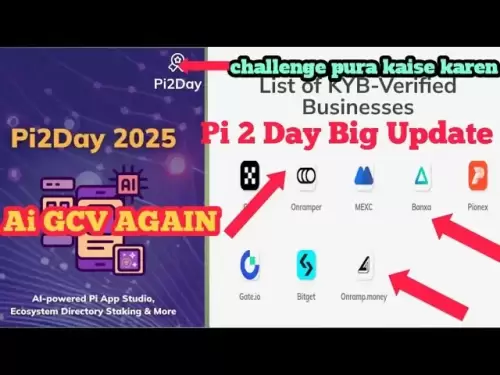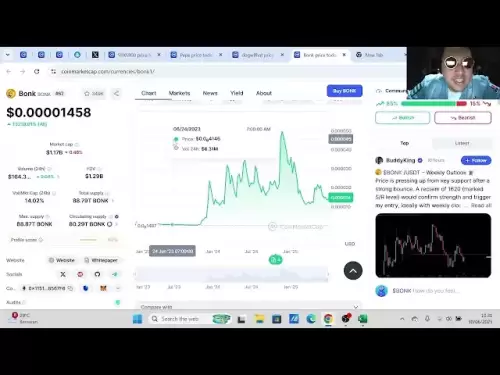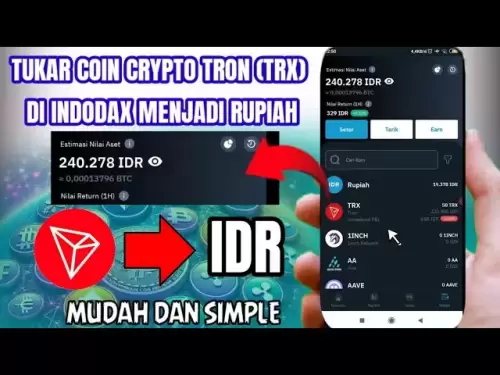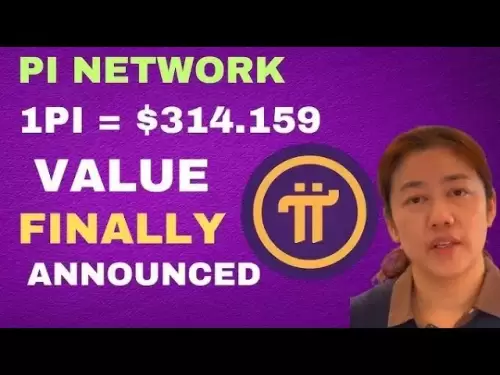-
 Bitcoin
Bitcoin $107,397.3430
-0.20% -
 Ethereum
Ethereum $2,467.5633
1.33% -
 Tether USDt
Tether USDt $1.0002
0.01% -
 XRP
XRP $2.1994
0.71% -
 BNB
BNB $655.8723
1.07% -
 Solana
Solana $157.3780
4.63% -
 USDC
USDC $1.0000
0.02% -
 TRON
TRON $0.2792
1.23% -
 Dogecoin
Dogecoin $0.1645
0.50% -
 Cardano
Cardano $0.5666
1.83% -
 Hyperliquid
Hyperliquid $39.8730
3.91% -
 Bitcoin Cash
Bitcoin Cash $514.7673
5.02% -
 Sui
Sui $2.7969
-0.51% -
 Chainlink
Chainlink $13.2880
0.07% -
 UNUS SED LEO
UNUS SED LEO $9.1148
-0.60% -
 Avalanche
Avalanche $17.9247
0.34% -
 Stellar
Stellar $0.2351
-0.98% -
 Toncoin
Toncoin $2.9456
2.69% -
 Shiba Inu
Shiba Inu $0.0...01144
-0.74% -
 Litecoin
Litecoin $85.9064
-0.62% -
 Hedera
Hedera $0.1495
1.47% -
 Monero
Monero $319.0339
3.82% -
 Polkadot
Polkadot $3.3940
-0.40% -
 Dai
Dai $1.0000
0.01% -
 Ethena USDe
Ethena USDe $1.0003
0.00% -
 Bitget Token
Bitget Token $4.5223
-1.95% -
 Uniswap
Uniswap $7.1384
-0.02% -
 Aave
Aave $272.7534
0.72% -
 Pepe
Pepe $0.0...09836
2.57% -
 Pi
Pi $0.5107
-2.06%
Is CRV OTC trading safe? How to avoid being scammed?
CRV OTC trading offers privacy but carries risks like counterparty failure and lack of oversight; verify traders' legitimacy and use secure methods to minimize these risks.
May 06, 2025 at 09:07 am
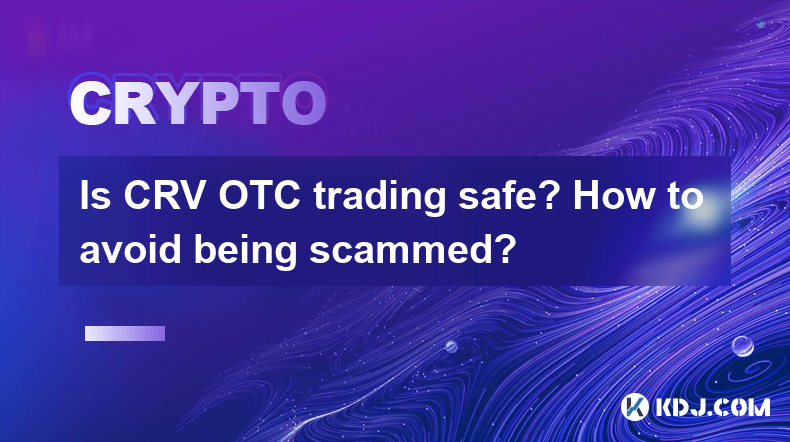
Understanding CRV OTC Trading
CRV, or Curve DAO Token, is the governance token of the Curve Finance platform, a decentralized exchange liquidity pool on Ethereum designed for extremely efficient stablecoin trading. OTC (Over-The-Counter) trading involves trading directly between two parties without the oversight of an exchange. This method of trading can offer more privacy and flexibility compared to trading on public exchanges. However, the safety of CRV OTC trading hinges on various factors, including the trustworthiness of the trading counterparty and the security measures implemented during the transaction.
Risks Associated with CRV OTC Trading
Engaging in CRV OTC trading comes with its set of risks. The primary risk is the counterparty risk, where the other party in the trade may fail to fulfill their obligations. This could result in the loss of funds or tokens. Another significant risk is the lack of regulatory oversight, which can make it challenging to seek recourse if something goes wrong. Additionally, information asymmetry can be a concern, where one party may have more information than the other, leading to unfair trades.
How to Verify the Legitimacy of OTC Traders
To ensure safety in CRV OTC trading, verifying the legitimacy of the trader is crucial. Here are some steps to take:
- Conduct thorough background checks: Use online resources to research the trader's reputation. Look for reviews, testimonials, and any history of scams or fraudulent activities.
- Check for verifiable contact information: Legitimate traders will have verifiable contact details, such as a professional email address or a business phone number.
- Use escrow services: Employing an escrow service can add an additional layer of security. The escrow service holds the funds until both parties fulfill their obligations.
- Verify identity: Request identity verification documents to ensure you are dealing with a real person or entity.
Best Practices for Safe CRV OTC Trading
To minimize the risks associated with CRV OTC trading, follow these best practices:
- Use secure communication channels: Always use encrypted messaging apps or secure email services to discuss trade details.
- Document everything: Keep detailed records of all communications, agreements, and transactions. This can be useful in case of disputes.
- Start small: If you are new to OTC trading, start with smaller trades to build trust and gain experience.
- Be cautious of too-good-to-be-true offers: If an offer seems too good to be true, it probably is. Be wary of traders promising unusually high returns or discounts.
Common Scams in CRV OTC Trading and How to Avoid Them
Several common scams target OTC traders, and being aware of these can help you avoid falling victim to them. Here are some prevalent scams and how to steer clear of them:
- Pump and Dump Scams: Scammers may artificially inflate the price of CRV and then sell their holdings at the peak, leaving other investors with devalued tokens. To avoid this, always conduct your own research and be skeptical of sudden price spikes.
- Phishing Scams: Fraudsters may pose as legitimate traders and trick you into revealing sensitive information or transferring funds to them. Always verify the identity of the trader and use secure communication methods.
- Fake Escrow Services: Scammers may set up fake escrow services to steal your funds. Only use well-known and reputable escrow services.
- Advance Fee Scams: Scammers may ask for an upfront fee to facilitate the trade, only to disappear after receiving the payment. Never pay any fees before the trade is completed and verified.
Steps to Take if You Suspect a Scam
If you suspect you are being scammed during a CRV OTC trade, take immediate action to protect yourself:
- Stop all communication: Cease all interactions with the suspected scammer to prevent further manipulation.
- Report the scam: Inform relevant authorities, such as local law enforcement or cryptocurrency scam reporting platforms, about the incident.
- Secure your accounts: Change passwords and enable two-factor authentication on all related accounts to prevent further unauthorized access.
- Seek legal advice: Consult with a legal professional to understand your options for recovering lost funds and pursuing legal action against the scammer.
Frequently Asked Questions
Q: Can I use a third-party service to facilitate CRV OTC trades safely?
A: Yes, using reputable third-party services, such as escrow services or OTC desks, can enhance the safety of your CRV OTC trades. These services act as intermediaries, holding funds until both parties fulfill their obligations, thereby reducing the risk of fraud.
Q: How can I ensure the CRV tokens I receive in an OTC trade are legitimate?
A: To ensure the legitimacy of CRV tokens, you can use blockchain explorers to verify the token's transaction history and check for any suspicious activities. Additionally, using a reputable wallet that supports token verification can help confirm the authenticity of the tokens.
Q: Are there any specific red flags to watch out for when engaging in CRV OTC trading?
A: Yes, some red flags to watch out for include traders who are unwilling to provide verifiable identity information, those who pressure you to make quick decisions, and offers that promise unusually high returns or discounts. Always proceed with caution and conduct thorough due diligence.
Q: Can I recover funds if I fall victim to a CRV OTC trading scam?
A: Recovering funds from a scam can be challenging, but it is possible in some cases. Immediate action, such as reporting the scam to authorities and seeking legal advice, can increase your chances of recovering lost funds. Additionally, using secure and traceable payment methods can aid in the recovery process.
Disclaimer:info@kdj.com
The information provided is not trading advice. kdj.com does not assume any responsibility for any investments made based on the information provided in this article. Cryptocurrencies are highly volatile and it is highly recommended that you invest with caution after thorough research!
If you believe that the content used on this website infringes your copyright, please contact us immediately (info@kdj.com) and we will delete it promptly.
- Unlock Crypto Riches: Mining Platforms & Starter Bonuses - Your Gateway to Digital Gold!
- 2025-06-30 22:30:11
- Dogecoin, Cloud Mining, and Risk Alerts: Navigating the Meme Minefield
- 2025-06-30 22:30:11
- Ric Edelman's Bold Crypto Allocation: A Financial Advisor's Perspective
- 2025-06-30 22:50:12
- Bitcoin Layer-2 Presale Heats Up: Is HYPER the Next Big Thing?
- 2025-06-30 22:50:12
- Bitcoin's Bull Run: Network Activity Tells a Different Story
- 2025-06-30 22:55:12
- SpacePay, Altcoins & Investing in 2025: What's the Buzz?
- 2025-06-30 23:10:12
Related knowledge

How to customize USDT TRC20 mining fees? Flexible adjustment tutorial
Jun 13,2025 at 01:42am
Understanding USDT TRC20 Mining FeesMining fees on the TRON (TRC20) network are essential for processing transactions. Unlike Bitcoin or Ethereum, where miners directly validate transactions, TRON uses a delegated proof-of-stake (DPoS) mechanism. However, users still need to pay bandwidth and energy fees, which are collectively referred to as 'mining fe...

USDT TRC20 transaction is stuck? Solution summary
Jun 14,2025 at 11:15pm
Understanding USDT TRC20 TransactionsWhen users mention that a USDT TRC20 transaction is stuck, they typically refer to a situation where the transfer of Tether (USDT) on the TRON blockchain has not been confirmed for an extended period. This issue may arise due to various reasons such as network congestion, insufficient transaction fees, or wallet-rela...

How to cancel USDT TRC20 unconfirmed transactions? Operation guide
Jun 13,2025 at 11:01pm
Understanding USDT TRC20 Unconfirmed TransactionsWhen dealing with USDT TRC20 transactions, it’s crucial to understand what an unconfirmed transaction means. An unconfirmed transaction is one that has been broadcasted to the blockchain network but hasn’t yet been included in a block. This typically occurs due to low transaction fees or network congestio...

How to check USDT TRC20 balance? Introduction to multiple query methods
Jun 21,2025 at 02:42am
Understanding USDT TRC20 and Its ImportanceUSDT (Tether) is one of the most widely used stablecoins in the cryptocurrency market. It exists on multiple blockchain networks, including TRC20, which operates on the Tron (TRX) network. Checking your USDT TRC20 balance accurately is crucial for users who hold or transact with this asset. Whether you're sendi...

What to do if USDT TRC20 transfers are congested? Speed up trading skills
Jun 13,2025 at 09:56am
Understanding USDT TRC20 Transfer CongestionWhen transferring USDT TRC20, users may occasionally experience delays or congestion. This typically occurs due to network overload on the TRON blockchain, which hosts the TRC20 version of Tether. Unlike the ERC20 variant (which runs on Ethereum), TRC20 transactions are generally faster and cheaper, but during...

The relationship between USDT TRC20 and TRON chain: technical background analysis
Jun 12,2025 at 01:28pm
What is USDT TRC20?USDT TRC20 refers to the Tether (USDT) token issued on the TRON blockchain using the TRC-20 standard. Unlike the more commonly known ERC-20 version of USDT (which runs on Ethereum), the TRC-20 variant leverages the TRON network's infrastructure for faster and cheaper transactions. The emergence of this version came as part of Tether’s...

How to customize USDT TRC20 mining fees? Flexible adjustment tutorial
Jun 13,2025 at 01:42am
Understanding USDT TRC20 Mining FeesMining fees on the TRON (TRC20) network are essential for processing transactions. Unlike Bitcoin or Ethereum, where miners directly validate transactions, TRON uses a delegated proof-of-stake (DPoS) mechanism. However, users still need to pay bandwidth and energy fees, which are collectively referred to as 'mining fe...

USDT TRC20 transaction is stuck? Solution summary
Jun 14,2025 at 11:15pm
Understanding USDT TRC20 TransactionsWhen users mention that a USDT TRC20 transaction is stuck, they typically refer to a situation where the transfer of Tether (USDT) on the TRON blockchain has not been confirmed for an extended period. This issue may arise due to various reasons such as network congestion, insufficient transaction fees, or wallet-rela...

How to cancel USDT TRC20 unconfirmed transactions? Operation guide
Jun 13,2025 at 11:01pm
Understanding USDT TRC20 Unconfirmed TransactionsWhen dealing with USDT TRC20 transactions, it’s crucial to understand what an unconfirmed transaction means. An unconfirmed transaction is one that has been broadcasted to the blockchain network but hasn’t yet been included in a block. This typically occurs due to low transaction fees or network congestio...

How to check USDT TRC20 balance? Introduction to multiple query methods
Jun 21,2025 at 02:42am
Understanding USDT TRC20 and Its ImportanceUSDT (Tether) is one of the most widely used stablecoins in the cryptocurrency market. It exists on multiple blockchain networks, including TRC20, which operates on the Tron (TRX) network. Checking your USDT TRC20 balance accurately is crucial for users who hold or transact with this asset. Whether you're sendi...

What to do if USDT TRC20 transfers are congested? Speed up trading skills
Jun 13,2025 at 09:56am
Understanding USDT TRC20 Transfer CongestionWhen transferring USDT TRC20, users may occasionally experience delays or congestion. This typically occurs due to network overload on the TRON blockchain, which hosts the TRC20 version of Tether. Unlike the ERC20 variant (which runs on Ethereum), TRC20 transactions are generally faster and cheaper, but during...

The relationship between USDT TRC20 and TRON chain: technical background analysis
Jun 12,2025 at 01:28pm
What is USDT TRC20?USDT TRC20 refers to the Tether (USDT) token issued on the TRON blockchain using the TRC-20 standard. Unlike the more commonly known ERC-20 version of USDT (which runs on Ethereum), the TRC-20 variant leverages the TRON network's infrastructure for faster and cheaper transactions. The emergence of this version came as part of Tether’s...
See all articles





















